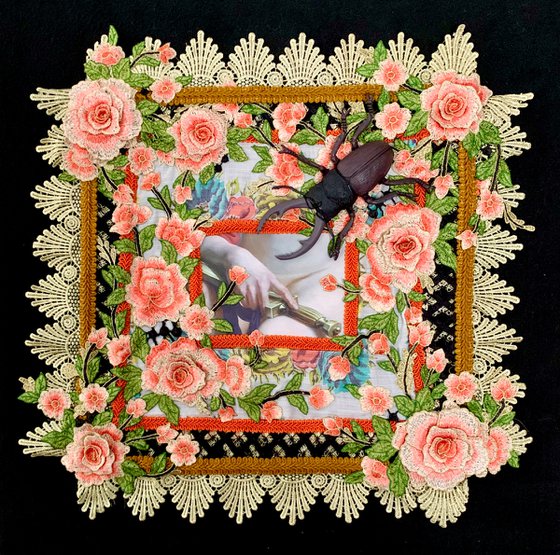- By medium
- By subject
- By budget
- Sales
- Gift cards
- Discover all art
- Artists
- Editors’ picks
- Ideas
Original artwork description:
ARTIST’S STATEMENT: VERONICA’S CLOTHS
While this body of work is not about a particular religious belief or cannon, the series title takes its name from the St. Veronica legend. It is said Veronica wiped Christ’s face with her veil during his journey carrying the cross. The image of his face miraculously left an impression on the cloth. The series Veronica’s Cloths explores the residual nature of physical and emotional trauma in a contemporary context of my experience as a woman.
Each work is a collage assembled on a vintage handkerchief in a manner purposefully pointing to that which is “grandmotherly,” wise, and reflective. The unexpected juxtapositions of familiar materials, emotionally-charged images, and menacing objects (insects, spiders, snakes) are designed to attract and repel the viewer – an uncanny valley.
The works are informed by my heritage as an Irish-American (non-practicing) Roman Catholic and my beliefs in feminism, secular humanism, and social justice. Writings on phenomenology, ontology, hauntology, and semiotics provide theoretical underpinnings. I admire contemporary vernacular art, Mexican retablos, Huipil Grande Traje de Gala of the Istmo de Tehuntepec tradition and other types of resplandors, religious shrines, Baroque art, 17th Century Dutch still life paintings, Haitian Voudou flags, and African power figures (nkisi) of Kongo tradition.
This piece was published in
Superstition Review, Issue 25, 2020, Arizona State University, Mesa, AZ
Inverted Syntax, Issue 2, February 2020.
Raw Art Review Fall 2019, March 2020.
Materials used:
Fabric, plastic
Featured by our Editors:
Justice or Job (Stag Beetle) (2019) Collage
by K. Johnson Bowles
£2,040.96
- Collage on Fabric
- One of a kind artwork
- Size: 45.72 x 45.72 x 7.62cm (unframed)
- Signed on the back
- Style: Collage
- Subject: Flowers and plants
Loading
Original artwork description
ARTIST’S STATEMENT: VERONICA’S CLOTHS
While this body of work is not about a particular religious belief or cannon, the series title takes its name from the St. Veronica legend. It is said Veronica wiped Christ’s face with her veil during his journey carrying the cross. The image of his face miraculously left an impression on the cloth. The series Veronica’s Cloths explores the residual nature of physical and emotional trauma in a contemporary context of my experience as a woman.
Each work is a collage assembled on a vintage handkerchief in a manner purposefully pointing to that which is “grandmotherly,” wise, and reflective. The unexpected juxtapositions of familiar materials, emotionally-charged images, and menacing objects (insects, spiders, snakes) are designed to attract and repel the viewer – an uncanny valley.
The works are informed by my heritage as an Irish-American (non-practicing) Roman Catholic and my beliefs in feminism, secular humanism, and social justice. Writings on phenomenology, ontology, hauntology, and semiotics provide theoretical underpinnings. I admire contemporary vernacular art, Mexican retablos, Huipil Grande Traje de Gala of the Istmo de Tehuntepec tradition and other types of resplandors, religious shrines, Baroque art, 17th Century Dutch still life paintings, Haitian Voudou flags, and African power figures (nkisi) of Kongo tradition.
This piece was published in
Superstition Review, Issue 25, 2020, Arizona State University, Mesa, AZ
Inverted Syntax, Issue 2, February 2020.
Raw Art Review Fall 2019, March 2020.
Materials used:
Fabric, plastic
Featured by our Editors:
14 day money back guaranteeLearn more

